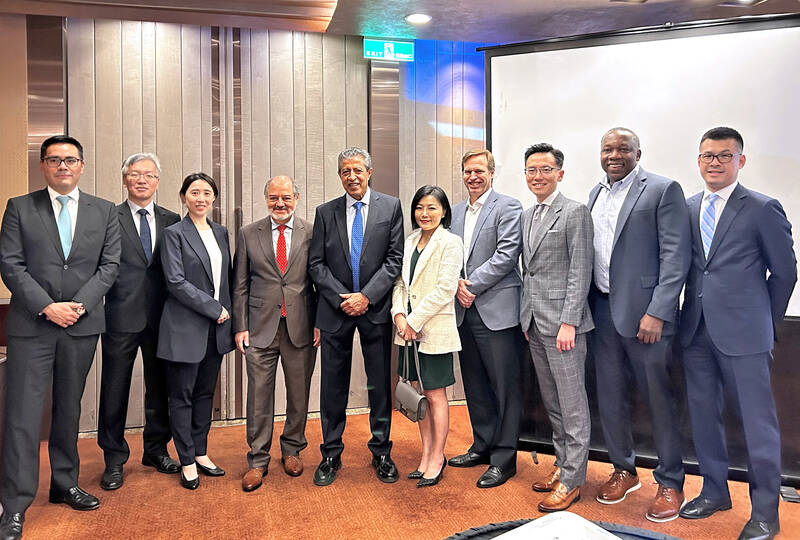Citi Taiwan and Citibanamex, jointly organized a “Mexico Day”client forum in Taipei to demonstrate Citi’s strong support for clients existing and potential investments in Mexico and foster the further development of the Taiwan-Mexico trade corridor.
“Mexico is now the largest trading partner for the U.S. and it offers tremendous nearshoring benefits such as faster delivery to buyers, lower transportation costs and helping buyers achieve their just-in-time inventory management objectives. Citi has an exceptionally large presence in Mexico and is well-positioned to help our clients with their banking needs,” remarked Aftab Ahmed, Chairman of Citibank Taiwan.

Mexico has emerged as a preferred destination for Taiwanese businesses seeking to establish nearshoring supply chains for expanding into the U.S. market. Over 300 Taiwanese enterprises have ventured into the Mexican market across various sectors including cloud computing, industrial servers, computers, LED TV assembly, and automotive components. The bilateral trade value between Taiwan and Mexico surged from $5.386 billion in 2021 to $6.368 billion in 2023, marking an impressive 18% increase.
Susan Wang, Citi Taiwan Head of Corporate Banking, pointed out the rising trend of “Close to Home” seen across notable global multinational corporations. Mexico is a prime destination for global leading manufacturers due to its proximity to the U.S. market, potentially mitigating risks and costs associated with manufacturing. To support Taiwanese companies’ expansion plan in Mexico, Citi’s global teams are dedicated to deliver prompt service to clients round-the-clock.
Martin Torres, Head of the Office of Mexico in Taiwan, highlighted Mexico’s strategic significance as a gateway to North America, Latin America, and the global market. With clusters such as the automobile and manufacturing industries, coupled with a skilled and cost-effective workforce, Mexico is attracting more foreign investment. Torres urged Taiwanese companies to capitalize on Mexico’s potential and regard it as a frontier to penetrate the U.S. market.
As a leading international bank with a physical presence in 95 markets, Citi is well positioned to leverage the strength of its global network and provide comprehensive financial services and solutions to support clients in business growth. In terms of optimizing working capital and cross-border cash flow, Citi provides corporate clients with international remittance services in 140 different currencies. Moreover, Citi has launched mobile banking for enterprises, remittance intelligent detection services, liquidity management and automated reconciliation services to help clients flexibly handle various operational and funding needs.

Vincent Wei led fellow Singaporean farmers around an empty Malaysian plot, laying out plans for a greenhouse and rows of leafy vegetables. What he pitched was not just space for crops, but a lifeline for growers struggling to make ends meet in a city-state with high prices and little vacant land. The future agriculture hub is part of a joint special economic zone launched last year by the two neighbors, expected to cost US$123 million and produce 10,000 tonnes of fresh produce annually. It is attracting Singaporean farmers with promises of cheaper land, labor and energy just over the border.

US actor Matthew McConaughey has filed recordings of his image and voice with US patent authorities to protect them from unauthorized usage by artificial intelligence (AI) platforms, a representative said earlier this week. Several video clips and audio recordings were registered by the commercial arm of the Just Keep Livin’ Foundation, a non-profit created by the Oscar-winning actor and his wife, Camila, according to the US Patent and Trademark Office database. Many artists are increasingly concerned about the uncontrolled use of their image via generative AI since the rollout of ChatGPT and other AI-powered tools. Several US states have adopted

A proposed billionaires’ tax in California has ignited a political uproar in Silicon Valley, with tech titans threatening to leave the state while California Governor Gavin Newsom of the Democratic Party maneuvers to defeat a levy that he fears would lead to an exodus of wealth. A technology mecca, California has more billionaires than any other US state — a few hundred, by some estimates. About half its personal income tax revenue, a financial backbone in the nearly US$350 billion budget, comes from the top 1 percent of earners. A large healthcare union is attempting to place a proposal before

KEEPING UP: The acquisition of a cleanroom in Taiwan would enable Micron to increase production in a market where demand continues to outpace supply, a Micron official said Micron Technology Inc has signed a letter of intent to buy a fabrication site in Taiwan from Powerchip Semiconductor Manufacturing Corp (力積電) for US$1.8 billion to expand its production of memory chips. Micron would take control of the P5 site in Miaoli County’s Tongluo Township (銅鑼) and plans to ramp up DRAM production in phases after the transaction closes in the second quarter, the company said in a statement on Saturday. The acquisition includes an existing 12 inch fab cleanroom of 27,871m2 and would further position Micron to address growing global demand for memory solutions, the company said. Micron expects the transaction to